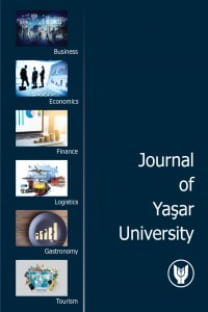Sürdürülebilir Turizm: Alaçatı Destinasyonuna Yönelik Bir Uygulama
Ülkelerin sahip olduğu doğal ve sosyo-kültürel kaynaklar turistleri destinasyona çeken en önemli faktörler olarak kabul edilmektedir. Bu kaynaklarda meydana gelecek tahribatlar kimi zaman geri dönüşümü olmayan sonuçlara neden olmaktadır. Sürdürülebilirlik kavramının destinasyonlar tarafından anlaşılması ve alınacak bir takım önemler ile bu tahribatın önüne geçilmektedir. Bu çalışma Alaçatı destinasyonunun sahip olduğu turistik çekiciliklerin sürdürülebilirliğinin irdelenmesi amacı ile yapılmıştır. Araştırma nitel veri toplama araçlarından görüşme tekniği ile gerçekleştirilmiştir. Araştırmada sivil toplum kuruluşları, yerel yönetim ve işletme yöneticileri olmak üzere toplam 15 kişi ile görüşülmüştür. Araştırma sonucunda destinasyonun kaynaklarının sürdürülebilirliği için özel sektör, kamu sektörü ve sivil toplum kuruluşlarının işbirliği çerçevesinde ortak fikir üretip ve uygulamaya geçmesi gerekliliği tespit edilmiştir.
Anahtar Kelimeler:
Sürdürülebilir Turizm, Destinasyon, Yarı Yapılandırılmış Görüşme Tekniği, Alaçatı
-
Natural beauties and socio-cultural resources of countries are the main factors for attracting tourists to these tourist destinations. Any destruction on these resources may cause irreversible damages on tourism industry. Sustainability concept in tourism is very important and irreversible damages on touristic and natural resources may be avoidable by taking some precautions. Main objective of this study is to examine and disccuss the sustainability of tourism attraction of Alaçatı, İzmir. The study was conducted by using interviewing technique of qualitative data collection tools. In the study, a total of 15 people including non-governmental organizations, local authorities, and private business managers of tourism sector were interviewed. The study has shown that for sustainable advancement of tourism resources of Alaçatı, collaboration and continuous efforts of these three sectors: goverment, non-government asssociations and, private companies are necessary for debating coming issues, generating new ideas and solving any problems before it has become an unrecoverable scale
___
- Aktaş, Gürhan (2007). Turistik Çekicilikler, Genel Turizm, (Ed. Orhan İçöz), Ankara , 99-115.
- Avcıkurt, Cevdet. (2007). Turizm Sosyolojisi, Detay Yayıncılık, Ankara.
- Baker, Micheal J., Emma Cameron, (2008), Critical Success Factors in Destination Marketing, Tourism and Hospitality Research, 8(2), 79-97.
- Buhalis, Dimitrios (1999). Limits of Tourism Development in Peripheral Destinations: Poblems and Challenges, Tourism Management, 20(2), 183-185.
- Buhalis, Dimitrios (2000), Marketing the Competitive Destination of the Future, Tourism Management, 21(1), 97-116.
- Çetin, Murat (2006) . “Teori ve Uygulamada Bölgesel Sürdürülebilir Kalkınma”, C.Ü. İktisadi ve İdari Bilimler Dergisi, 7(1), 1-7.
- David L. Edgell Sr. (2006), Managing Sustainable Tourism a Legacy for the Future, Haworth Press: NewYork.
- Doğan, Hasan Zafer (2004). Turizmin Sosyo-Kültürel Temelleri, Detay Yayıncılık, Ankara.
- Fernardo Vera Rebollo ve Josep A. Ivars Baidal, (2003) Measuring Sustainability in a Mass Tourist Destination: Pressures, Perceptions and Policy Responses in Torrevieja, Spain, Journal of Sustainable Tourism, 11(2), 181-203.
- Hardy, A.L.ve Beeton, R.J.S. (2009). Sustainable Tourism or Maintainable Tourism: Managing Resources For More Than Average Outcomes, Journal of Sustainable Tourism, 9 (3) ,168-192.
- http://www.channelingreality.com/Documents/Brundtland_Searchable.pdf DEVELOPMENT AND INTERNATIONAL ECONOMIC CO-OPERATION: ENVIRONMENT Report of the World Commission on Environment and Development, Erişim 10.03.2014.
- Hunter, Colin, (2002). Sustainable Toursim and The Touristic Ecological Footprint, Environment and Sustainable Development, 4(1), 7-20.
- Kaya, İsmet (1997). Sürdürülebilir Turizm Kalkınması ve Ülkemiz Açısından Bir Değerlendirme, (Yayınlanmamış Doktora Tezi), Balıkesir Üniversitesi Sosyal Bilimler Enstitüsü Turizm İşletmeciliği ve Otelcilik Anabilim Dalı, Balıkesir.
- Mazilu, Mirela (2010). "Towards a model of an optimal-sustainable tourist destination” publish in. Proceedings of International Conference: Cultural, Urban and Tourism Heritage, 28-34.
- Mazilu, Mirela (2012), Sustainable Tourism of Destination, Imperative Triangle Among: Competitiveness, Effective Management and Proper Financing, http://cdn.intechopen.com/pdfs-wm/29224.pdf , 5-35, (Erişim:10.04.2013).
- Tüsiad, Sürdürülebilir Turizm, (2012), 26-27.
- Usta, Öcal (2009) . Turizm Genel ve Yapısal Yaklaşım, Detay Yayıncılık, Ankara.
- World Tourism Organization (1993), Sustainable Tourism Development: Guide for Local Planners, Spain.
- Yüksek, Murat (2010) . Sürdürülebilir Kalkınma ve Türkiye’de Çevre Politikaları, (Yayınlanmamış Yüksek Lisans Tezi), Gaziantep Üniversitesi Sosyal Bilimler Enstitüsü İktisat Anabilim Dalı, Gaziantep.
- ISSN: 1305-970X
- Başlangıç: 2006
- Yayıncı: Yaşar Üniversitesi
Sayıdaki Diğer Makaleler
Sürdürülebilir Turizm: Alaçatı Destinasyonuna Yönelik Bir Uygulama
Evaluation of Validity and Reliability of the Turkish Version of the E-lifestyle Instrument
Mehmet OZAYDIN, Emine ILHAN, Mehmet BAYRAK
E-yaşam Tarzı Ölçeğinin Türkçe Geçerlilik ve Güvenilirliğinin Değerlendirilmesi
REEL DÖVİZ KURUNUN TÜRKİYE’NİN TURİZM GELİRLERİ ÜZERİNDEKİ ETKİSİNİN AMPİRİK ANALİZİ
SAĞLIK İDDİASI İÇEREN GIDA REKLAMLARININ İLETİŞİM ETKİSİNDE SAĞLIK İLGİNLİĞİNİN ROLÜ
